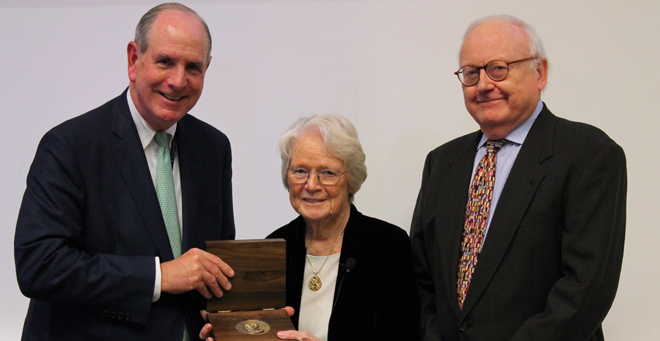 |
|
|
Patricia Donahoe accepts the 2018 Pincus Medal from Chancellor Collins (left) and Thoru Pederson |
Renowned pediatrician and cancer researcher Patricia Donahoe, MD, recipient of the 2018 Gregory Pincus Medal, delivered the Pincus Memorial Lecture at UMass Medical School on Wednesday, April 11. Dr. Donahoe, director of the Pediatric Surgical Research Laboratories at Massachusetts General Hospital and the Marshall K. Bartlett Professor of Surgery at Harvard Medical School, is leading expert in reproductive developmental biology and oncology.
Donahue’s hypothesis that a protein known as Müllerian-inhibiting substance (MIS) could serve as a potential anticancer agent against certain ovarian tumors, while still preserving fertility, has yielded promising results.
In her lecture, Donahoe reviewed her lab’s work with MIS, which includes collaboration with Guangping Gao, PhD, the Penelope Booth Rockwell Chair in Biomedical Research, professor of microbiology & physiological systems, director of the Horae Gene Therapy Center, and co-director of LI Weibo Institute for Rare Diseases Research at UMMS.
“Guangping put our engineered MIS construct into an AAV vector, and we were off and running with this bio-engineered gene therapy,” Donahoe said.
The ability to administer the AAV9-MIS as a single, long-acting injection makes the use of this effective but complex protein both clinically feasible and patient friendly. It is being investigated for novel and varied clinical uses, from birth control for feral cats to enhancing egg yield for in vitro fertilization to overcome infertility.
Most notable is early proof that MIS can preserve fertility in women of childbearing age who are undergoing chemotherapy for ovarian cancer. In studies co-authored by Donahoe, Gao and colleagues at Mass General Hospital and UMMS, MIS-treated animals given chemotherapy and co-treated with AAV9-MIS or recombinant MIS protein had significantly more egg follicles and ovarian reserve, vital to fertility, than controls.
“The discoveries that are being made right now are going to change the way we think of reproductive biology,” said Donahoe. “Treatment with MIS may provide a method of contraception as well as the unique characteristic of blocking primordial follicle activation that could be exploited to prevent the primary ovarian insufficiency often associated with chemotherapy.”
The annual Pincus Memorial Lecture is hosted by Thoru Pederson, PhD, the Vitold Arnett professor of cell biology, professor of biochemistry & molecular pharmacology, associate vice provost for research and president emeritus of the Worcester Foundation for Biomedical Research.
“Dr. Donahoe is among the world’s most influential reproductive scientists, unsurpassed in her contributions as a scientist, mentor and academic leader,” said Dr. Pederson. “In addition to her brilliant research originality and stunning productivity, she is widely regarded as a consummate teacher and mentor. Her contributions to women’s health are of enormous magnitude, as are those of the many distinguished trainees she has so inspiringly mentored.”
Donahoe received an honorary degree from UMMS at Commencement in 2017.
Established in 1969 to honor Gregory F. Pincus, a pioneer in reproductive biology and the co-founder of the Worcester Foundation for Biomedical Research, the Pincus Medal is awarded to investigators in the field of endocrinology. Seven of the recipients were or subsequently became Nobel laureates.
Related story on UMassMedNow:
UMass Medical School announces 2017 Commencement speaker, honorary degree recipients